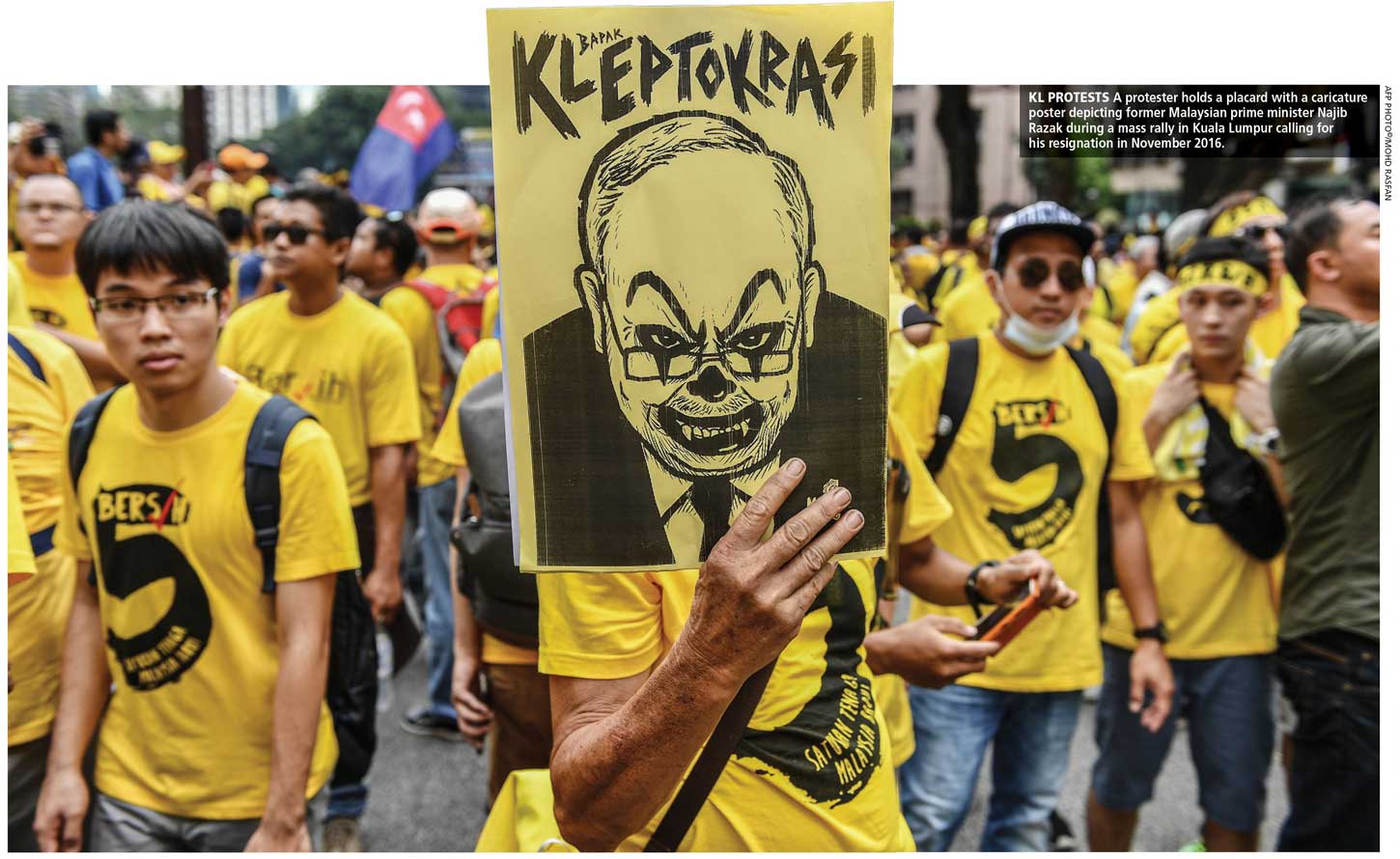GRAND LARCENY
CORRUPTION LONG DENIED
Rajika Jayatilake notes that Malaysia’s former premier Najib Razak is facing 12 years in prison for kleptocracy
In the end, bad deeds catch up with even the seemingly all-powerful. This was evident when Malaysia decided that former prime minister Najib Razak would become its first premier to be jailed for committing a criminal offence.
Malaysia’s Supreme Court recently upheld corruption charges brought against Razak in July 2020, and passed a sentence of 12 years in jail. Razak had been appealing the conviction for the past two plus years.
The story leading up to this dramatic finale is a classic tale of how absolute power corrupts absolutely.
Razak is the son and nephew of Malaysia’s second and third prime ministers respectively. He hails from Malay nobility and was the country’s sixth prime minister from 2009 to 2018. However, British educated Razak’s political life began much earlier as a 23-year-old lawmaker in 1976.
Problems began unfolding for him when documents on pilfering state funds were leaked, and international media reported in 2015 that around US$ 700 million from Malaysia’s government run strategic development company 1Malaysia Development Berhad (1MDB) had been wired into Razak’s personal bank accounts as five separate deposits.
1MDB was established in 2009 by the Malaysian government for investments in green energy and tourism. However, it turned out to be a symbol of grand scale corruption and was heavily criticised by Malaysians for its notorious financial mismanagement, and debts amounting to nearly 11.6 billion dollars.
Even worse, Razak chaired the 1MDB advisory board while the strategic organisation faced separate investigations by Malaysia’s Central Bank, its Auditor General, the Malaysian police and a Public Accounts Committee in Parliament.
Countering accusations, Razak wrote on his Facebook page: “Let me be very clear: I have never taken funds for personal gain as alleged by my political opponents…”
Yet, in July 2015, he fired Deputy Prime Minister Muhyiddin Yassin and Attorney General Abdul Gani Patail because they insisted on the need to investigate the allegations.
Meanwhile, the public took to the streets in Kuala Lumpur demanding Razak’s resignation, saying: “We, the Malaysians, want to clean up this country; we reject dirty politics.” The international community too condemned this corruption.
In September 2015, Swiss authorities froze tens of millions of US Dollars in Swiss bank accounts of people linked to 1MDB.
Meanwhile, the US Department of Justice (DOJ) alleged that Razak’s associates stole at least US$ 4.5 billion from 1MDB between 2009 and 2014, and laundered the money through different bank accounts in America and other countries. US authorities say the money was used to finance Hollywood movies and expensive purchases such as hotels, a luxury yacht, artworks and jewellery.
Then US Attorney General Jeff Sessions called this “kleptocracy at its worst.” And Director of the Financial Crimes Enforcement Network (FinCEN) Kenneth Blanco noted: “We simply will not allow the United States to be a place where corrupt individuals can expect to hide assets and lavishly spend money that should be used for the benefit of citizens of other nations.”
Since 2016, in the biggest ever case in its anti-kleptocracy programme, the DOJ has been filing civil lawsuits seeking to seize about 1.7 billion dollars of these stolen assets.
In January 2016, Attorney General Mohamed Apandi bin Ali, who was appointed by Razak after firing Patail, cleared Razak of all wrongdoing on the corruption charges. At the time, Ali claimed he was satisfied that the money was a “personal donation” by the Saudi royal family and not “a form of gratification given corruptly.”
Nevertheless, amidst swirling allegations of corruption and public anger, Razak was totally crushed and defeated in the 2018 elections by a coalition of parties headed by Malaysia’s former leader Dr. Mahathir Mohamad. Once in the seat of power, Mahathir reopened investigations into the 1MDB scandal.
The country’s Immigration Department immediately banned Razak and 11 others from leaving Malaysia, and the police seized over 500 handbags and some 12,000 pieces of jewellery from properties owned by Razak in the largest seizure of plunder in Malaysia’s history.
Since the change of government in 2018, there have been more investigations into corruption allegations against prominent politicians than at any other time in Malaysia’s history. In the most recent Corruption Perceptions Index published by Transparency International, Malaysia is ranked 62nd out of 180 countries.
Razak was subsequently charged with criminal breach of trust, money laundering and abuse of power, and sentenced to 12 years in prison. Alleged mastermind and financier Jho Low, who is now a fugitive, was also charged with money laundering.
The recent verdict by Malaysia’s Supreme Court was called ‘historic’ by the public on social media and termed ‘the tip of the iceberg’ in the uphill task of cleaning up the country’s corrupt political setup. Malaysians hope it will send a “strong warning to other politicians who even think of siphoning public funds.”
As the 33rd President of the US Harry Truman so aptly said: “You can’t get rich in politics unless you’re a crook.”
We simply will not allow the United States to be a place where corrupt individuals can expect to hide assets
Kenneth Blanco
Director of the Financial Crimes Enforcement Network





